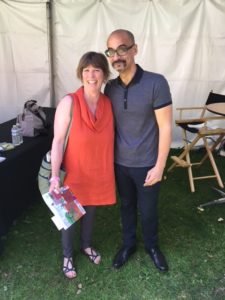
“Fools talk about diversity, but they can’t even imagine LA.” That was the first thing Junot Díaz said when he was introduced by LA Times writer Carolina Miranda at the LA Book Festival. It was just the beginning of a great hour-long talk.
I am sorry he’s disappeared from the landscape and hope it is temporary. He is too good a writer, and we can’t afford to lose his voice.
He is, of course, the author of the 2008 Pulitzer Prize-winning novel The Brief Wondrous Life of Oscar Wao. When I heard him at the book fesitval, I noticed that he could be measured and thoughtful, then suddenly urgent. He offered a political perspective about dictatorships one moment, then an intensely personal memory of being poor, the next. His mind is extraordinarily quick, and he fluidly shifted from English to Spanish and back again. He referred to his earthshaking piece in the New Yorker but did not want to discuss it as there were children in the audience.
He was there mostly to talk about his new children’s book Islandborn, with illustrations by Leo Espinoza. Again, I hope that this book gets the attention and audience that it deserves.
It’s about a little Afro-Caribbean girl named Lola who can’t remember the island where she was born because she was too little when she was brought to the U.S. by her parents. So she sets out to ask members of her extended family to describe the island so that she can “remember.” As they give her bits of information, she imagines for herself what these memories mean, adding her own whimsical interpretations. It’s a delightful story that feels very true to a child’s logic.
Díaz explained why it took him ten years to write the book — he didn’t want to be cute or to take shortcuts just because his audience would be children. How many writers are good enough to make those choices?
You have to be 100 percent faithful to the reader. So, his children’s book includes a monster—it comes up as a bad memory from one of the adults who’d left the island years before. In his talk, Díaz explained that the monster refers to the cruel dictator, Rafael Trujillo, who reigned for decades in the Dominican Republic.
In his exchanges with Carolina Miranda and audience members who asked questions, his compassion for writers, students and readers was evident. We need him.
